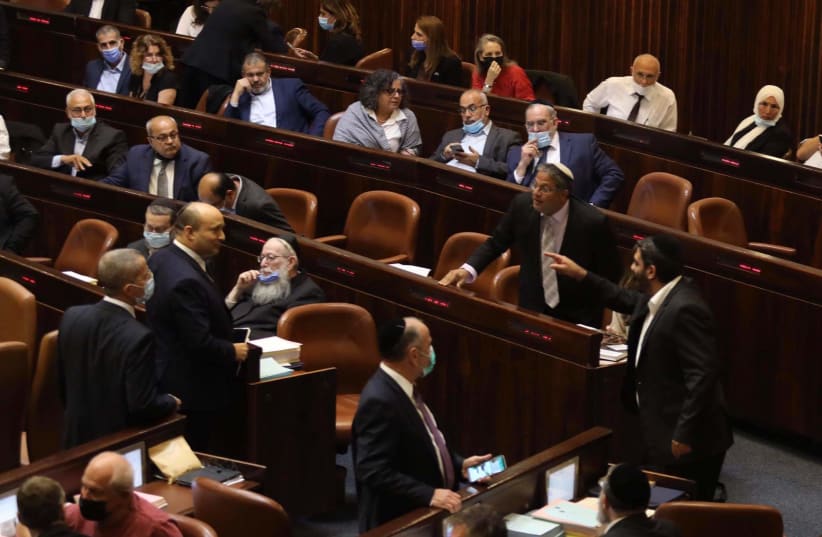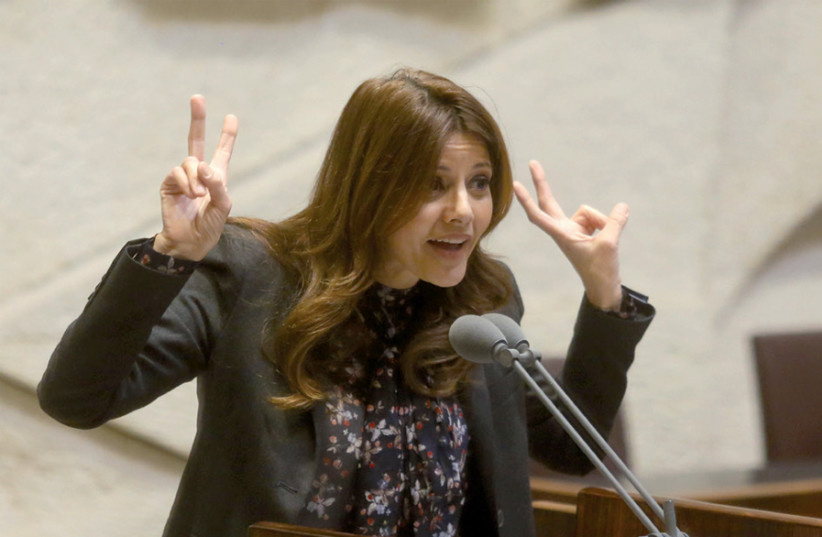The level of discourse in Israel appears to be deteriorating at a rapid pace. Reasoned debate on policy and issues has been replaced by name-calling, verbal harassment and worse.
As Israel approaches a final decision on whether to vaccinate children ages five to 11, violent and abusive threats, including death threats against health professionals are spiking.
But it is not just disgruntled anti-vaxxers who are erasing the norms of acceptable social behavior. We’re seeing it more and more in the Knesset, emanating from or directed toward MKs and government ministers and officials.
Although heckling and shouting by the opposition during speeches given by the prime minister is a longstanding (if uncouth) tradition, the extent to which opposition MKs and their leader Benjamin Netanyahu interrupted Prime Minister Naftali Bennett during his speech last week after the 2021 and 2022 budgets were passed was nothing short of appalling.
Consider these other examples. Likud MK Orly Levy-Abecassis verbally attacked a female Knesset usher last week after she was ejected from a Knesset Finance Committee on the instructions of the Knesset Committee chairman.
“Get your hands off me... don’t touch me,” she yelled at the usher in the televised altercation.
Knesset Speaker Mickey Levy condemned MK Levy-Abecassis’s behavior and said, “The verbal violence used by members of the opposition has crossed all borders. Knesset employees will not be the punching bag of MKs who have lost all control,” and he called upon the opposition to enable the formation of an ethics committee, in order to deal with recent problematic incidents.
Levy also summoned Yamina MK Shirley Pinto to a meeting after she called after her colleague in Yamina, Amichai Chikli “a virus” in a TV interview.
Later, Pinto told 103 Radio that she was referring to a virus in a computer, not a virus that harms the health of people, but the damage and intent were done.
And then there’s the curious case of Yamina MK Idit Silman, who told Channel 12 news on Saturday she had been physically attacked at a gas station last month by a man evidently angered by Yamina being part of the government.
It’s an extremely grave incident but critics, including Netanyahu, have questioned the truthfulness of the claims, and Silman herself has refused to elaborate. Whether or not it really did take place, there are enough other examples of similar behavior that are raising the general alarm.
What kind of example is this kind of behavior for the rest of the country? If the leaders who we’re supposed to look up to as models act in such repugnant manners, then it’s no wonder that verbal abuse, lack of mutual respect and argumentativeness has evolved into part of the fabric of Israeli society.
Children and teens learn from the adults around them and what they see online. And what they’re seeing from the halls of the Knesset is not pretty.
Alternate Prime Minister Yair Lapid reacted to the events on Monday, saying, “The danger is not only that more politicians will be murdered here... the great danger is that this is what we’re becoming. This violence seeps into all aspects of our lives. On the roads, in schools. If we don’t stop this now, together, that means this is what we’ve become: a violent, hateful society.”
He also disclosed that he and his wife had recently received threatening messages, one expressing a wish he would die from cancer and likening him to Nazi leader Adolf Hitler.
“The political discourse must change,” said Lapid. “We can fiercely debate, we can disagree, but we can’t stand in the [Knesset] plenum and scream personal and despicable insults and smears. We must stop the hate before the hate stops us.”
The change has to come from the top, from the interaction we witness in the Knesset. The budget has passed, and there is a myriad of pressing issues the country has to deal with. It’s time for both the coalition and the opposition to focus on policies and issues and leave the name-calling and street-level attacks aside. Our elected leaders should be an example to the rest of us, not an embarrassment.

